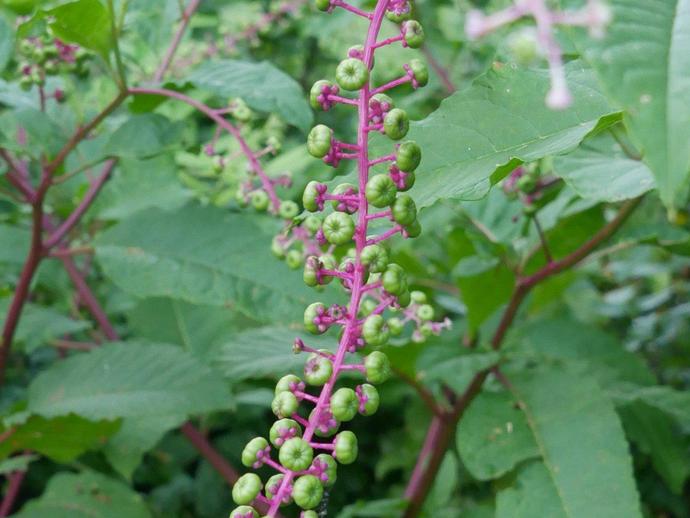August 11, 2020
American pokeweed (Phytolacca americana) is native to the eastern U.S., the Gulf Coast, and the Midwest, but it's probably most iconic in southern Appalachia. Back in the old days, people used to harvest the leaves and stems of young pokeweed plants to make "poke salad" or "poke sallet." Now I'm going to tell you why you should never do that!
While it is possible to (more or less) safely prepare pokeweed in the traditional Appalachian way, the risk ain't exactly worth the reward. All parts of the plant are toxic and become increasingly toxic as the plant matures. The roots and berries are particularly dangerous. You should be very careful if you have young children and pokeweed on your property; little kids often try to eat the appealing-looking purple-black berries, and even one berry can necessitate emergency treatment. If eaten, pokeweed causes vomiting and can eventually cause death due to respiratory paralysis.
This raises the question: how did people survive eating poke salad? One key element is that people used to only gather the youngest leaves and shoots which had not yet had the opportunity to build up a deadly amount of toxic compounds. Additionally, the leaves and shoots were always boiled at least twice and the water was replaced each time, which broke down and flushed out a lot of the toxins.
From what I've read, the leaves in poke salad taste a lot like spinach while the stems taste like asparagus. Given that spinach and asparagus can be easily purchased or grown at home, I vote for not eating the deadly poisonous plant and simply admiring it from a safe distance. #BenInNature
ABOUT THIS POST
Social distancing can be difficult, but it presents a great opportunity to become reacquainted with nature. While he is working from home, Administrator of Science Ben Williams is venturing outdoors each day to record a snapshot of the unique sights that can be found in the natural world.
NATURE PHOTO IDENTIFICATIONS
If you discover something in nature that you would like help identifying, be sure to message us right here on Facebook with a picture (please include location and date of picture) and we'll have our experts help you identify it!

 Hours & Admissions
Hours & Admissions Directions
Directions

